How Much Weight Is Normal to Gain During Your Period? (& 4 Common Causes of It)

Weight Gain During Your Period: What to Expect
People don't talk much about period weight gain, so you might be wondering whether it’s normal to gain weight on your period, when period weight gain starts or when period weight goes away. The answer: period weight gain is normal, and it will start in the days before your period and go away once your period is over.
Yeah, Mother Nature really looked at the list of period symptoms like cramps, bloating, mood swings and fatigue and thought, ”Let’s add weight gain to the list.”
Those are the basics, but let’s dive into why you gain weight on your period and what you can do about it.
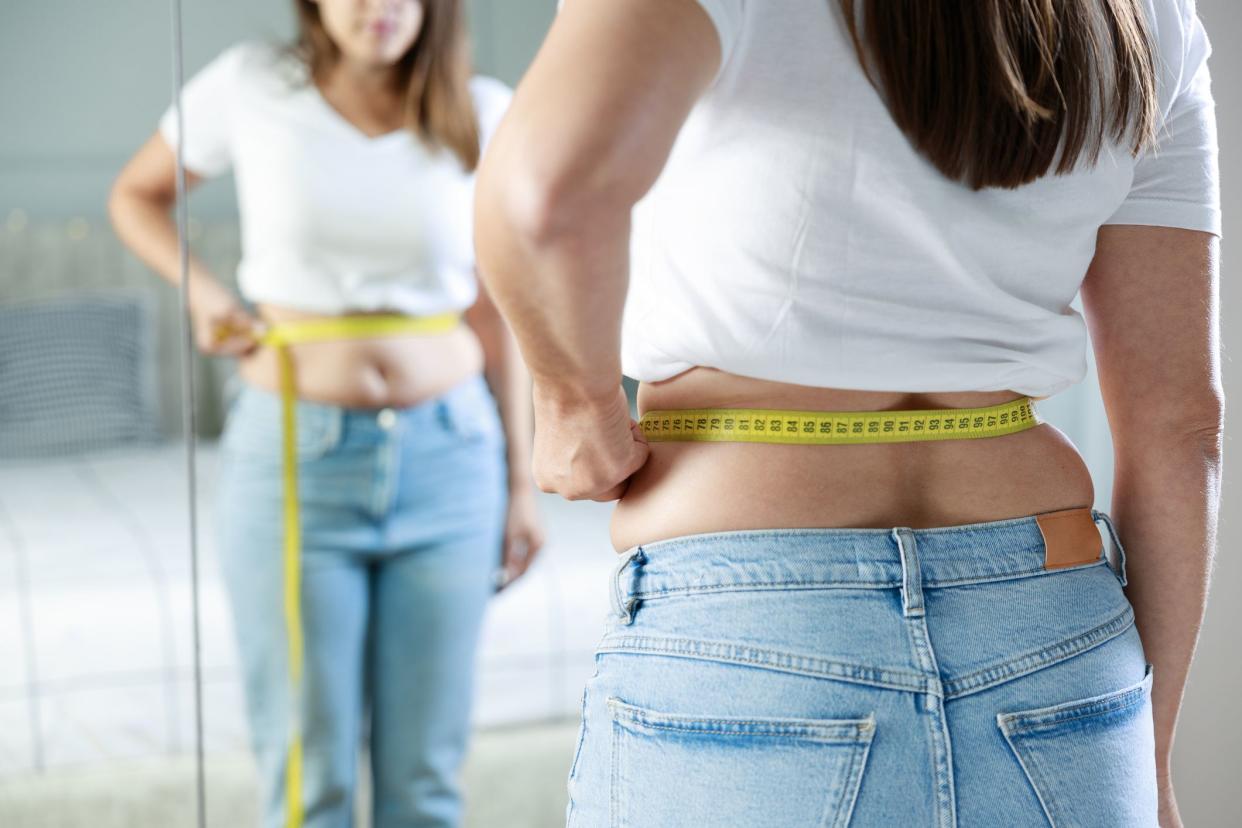
Causes of Period Weight Gain
We’re all different, but there are a few common causes of period weight gain. The important part to remember? They’re all normal.
Here’s what to blame.
Hormones Causing Fluid Retention
For many people, fluid retention is the main cause of weight gain before their period.
Research shows that self-reported fluid retention is highest on day one of your period. The reason for this is the hormonal changes that happen at this point in your cycle.
Here are the hormones at play and what effect they have:
Estrogens raise extracellular fluid levels. That’s the amount of fluid in your body outside of your cells. Levels of estrogens increase during the late follicular phase, just before ovulation.
Progesterone promotes water retention. Progesterone levels peak in the mid-luteal phase, about a week before your period.
So, do you weigh more on your period? Technically, yes. But it’s probably just excess water weight, not an increase in fat mass.

Cravings and Eating More
Food cravings for things like chocolate, carbs, candy and anything salty usually increase in the late-luteal phase — or the days leading up to your period. Your appetite might also increase during this time.
This can lead to eating more food than you usually do and eating more unhealthy foods. These (temporary) changes in eating habits can contribute to weight gain over time.
While they won’t cause immediate weight gain, you may feel sluggish and bloated if you’ve eaten a lot of sugar and salty foods during your period, adding to that weight gain feeling.
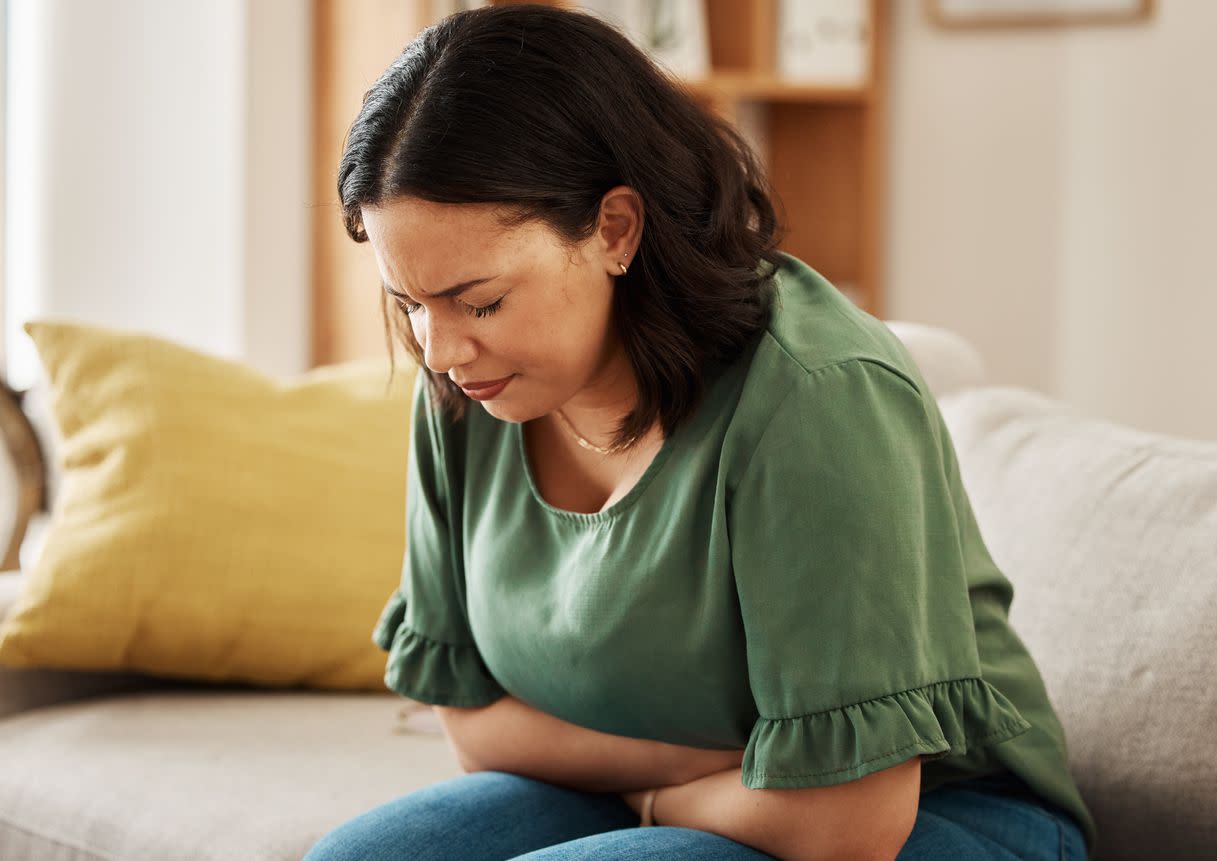
Bloating
Hormones are to blame for this one too.
Hormonal fluctuations around your period can change your gut motility, which is how food moves through your digestive system. They can also change your visceral perception, which is how sensitive you are to changes in your gut — like changes in gas — that can make you feel bloated.
While period bloating isn’t true weight gain, it can make your clothes feel tight and uncomfortable, and you may notice a difference in the mirror.
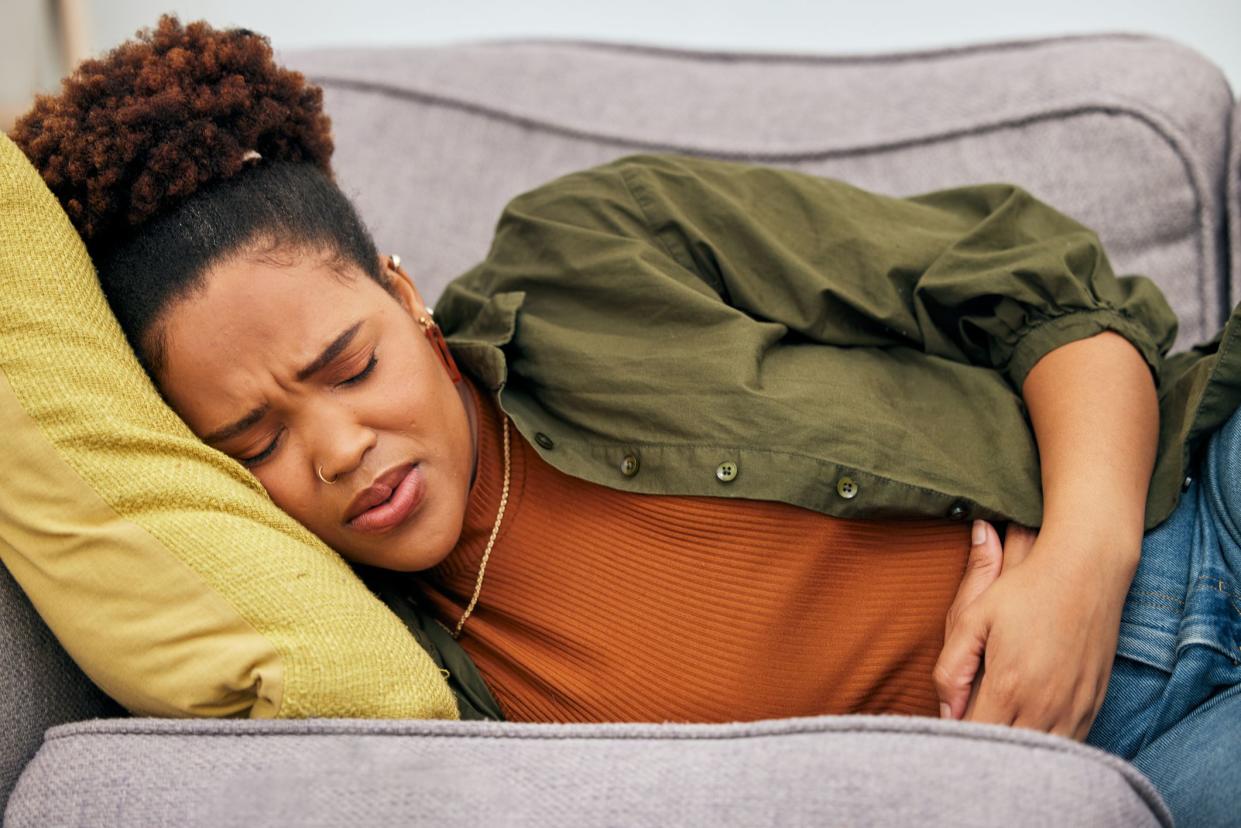
Gastrointestinal Issues
That time of the month brings more than just bloating. Both before and during your period, you might experience gastrointestinal (GI) issues like:
Abdominal pain
Diarrhea
Constipation
Nausea
Vomiting
These are pretty common and normal. A survey of 156 women found that 73 percent of women experience at least one of the above symptoms before or during their period.
Again, while they’re not directly tied to weight gain, you may feel like you’ve gained weight if stomach problems like constipation hit every month.
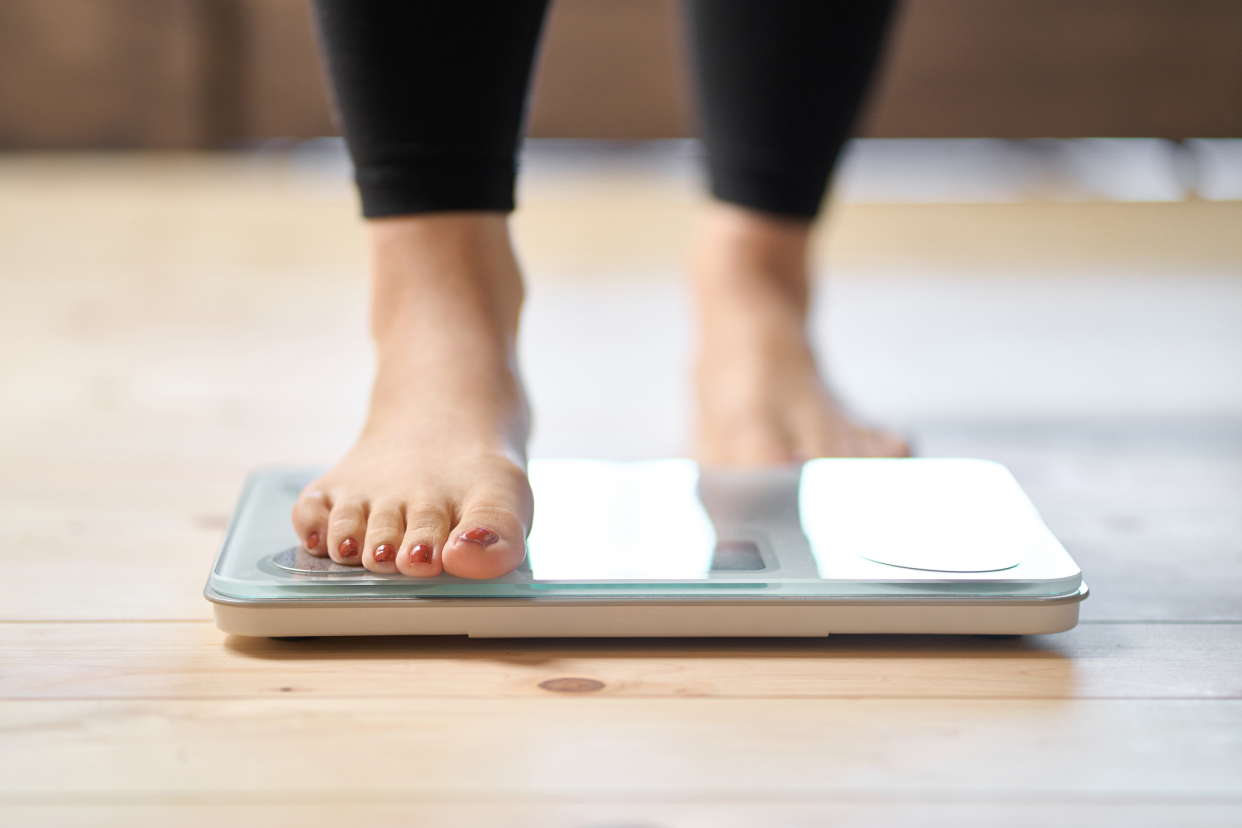
How Much Weight Is Normal to Gain During My Period?
There isn’t an average amount of weight gain during your period — that number will be different for all of us.
However, a 2023 study of 42 women found that their weight was almost one pound higher during their periods than in the first week of their menstrual cycles. This one-pound weight gain was primarily due to fluid retention.
When does period weight gain start? Again, that’ll vary from woman to woman. You may start to experience period weight in the days leading up to your period, and it should go away once your period is over.
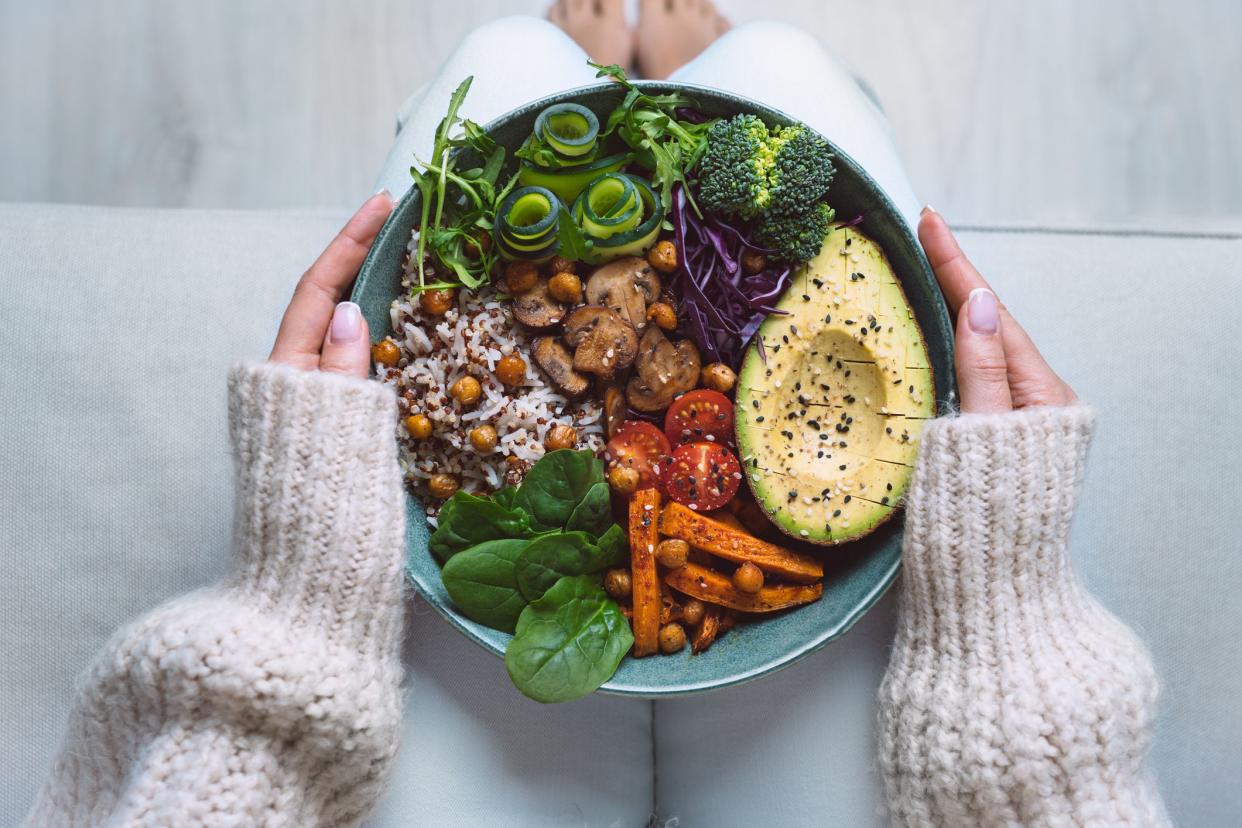
How to Treat Period Weight Gain
Period weight gain is a natural part of your menstrual cycle, but there are things you can do to manage bloating and maintain a healthy weight.
Here’s what to do:
Eat healthy foods. You can’t control your cravings, but you can control what’s in your cupboards. Stock up on nutritious foods like fruits, veggies, lean protein and whole grains — and don’t forget plenty of healthy snacks. Complex carbohydrates are particularly good to reach for, as they can reduce food cravings and premenstrual syndrome (PMS) mood symptoms. Go for whole wheat bread and pasta, brown rice and lentils.
Weight loss advice isn’t something to be taken lightly. There are lots of mixed messages out there, like when it comes to healthy snacking. Here you can check some healthy snacks to lose weight based on what the science says.

Do some movement
You might not feel like getting in your steps or pushing yourself in the gym when you’re on your period, and we don’t blame you. But getting some movement into your day can help reduce PMS symptoms and help you maintain a healthy weight generally. Aim for 30 minutes of aerobic exercise — think brisk walking, running, cycling or swimming — on most days of the week, not just when you feel symptoms.

Drink plenty of water
Drinking lots of water can help with weight management. It may also help to reduce fluid retention and bloating.
While this might sound too good to be true, there’s some solid science behind it. Read on to learn more about it.

Prioritize sleep
Cramps, bloating and diarrhea aren’t exactly a recipe for a good night’s sleep. But, if possible, try to get enough sleep. You should also go to bed and wake up at the same times each day — and yes, that includes weekends. Again, sleep can help with both weight management and keeping PMS symptoms under control.

Keep stress in check
Less stress = fewer PMS symptoms. Try stress management techniques like yoga, breathing exercises or massage therapy, and make time for self-care. If you need extra support, don’t hesitate to reach out to loved ones or a mental health professional.

Consider supplements and medications for bloating
If bloating and water retention cause real problems each month, reach out to a healthcare provider. They may recommend diuretics, which reduce water buildup. Magnesium supplements may also reduce bloating.

How to Prevent Period Weight Gain
There’s not much you can do about Mother Nature, but you can keep these tips in mind to maintain a healthy weight all month long:
Eat nutritious whole foods like the ones we mentioned above.
Get enough sleep.
Incorporate movement into your day.
Drink plenty of water.
If you have excess weight or obesity and you’re looking to lose weight generally, weight loss medications like metformin can help.

PMS and Period Symptoms Beyond Weight Gain
Periods are the gift that keeps on giving. Before your period, you may experience other symptoms alongside weight gain.
These symptoms are known as premenstrual syndrome or PMS. You’ll probably feel these symptoms in the days before your period starts. For some people, they happen every month and have a significant impact, while other people may only have them once in a while or only have minor symptoms.
PMS symptoms include:
Anxiety
Insomnia
Mood swings
Poor concentration
Breast tenderness
Headache
Fatigue
Aches and pains
Some of these symptoms may contribute to PMS weight gain.
For example, if you’re struggling with mood symptoms, it might be harder to stick to a healthy eating plan, and you probably won’t feel like exercising if you’re experiencing aches and pains.
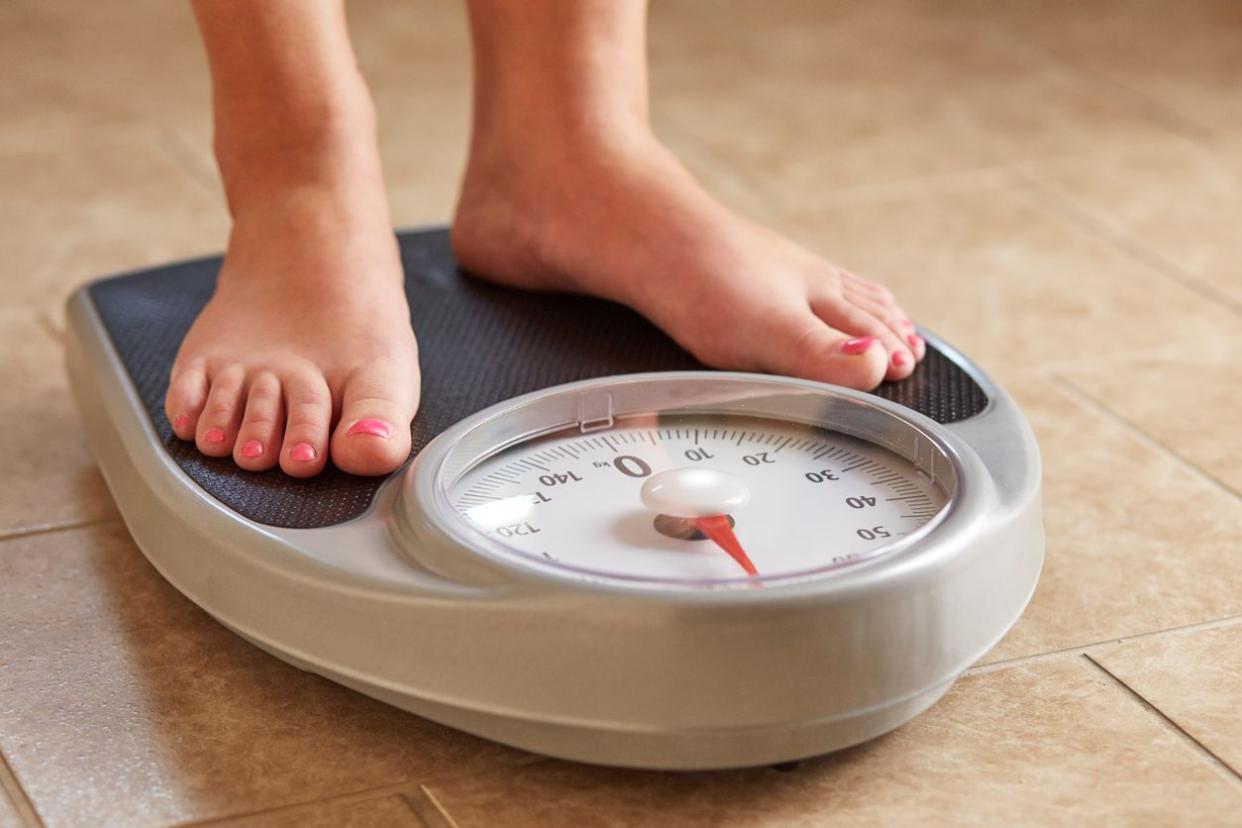
Period Weight Gain: The Bottom Line
So, do you gain weight on your period? Yep, and it’s totally normal to experience weight fluctuations around that time of the month.
Here are the key things to know:
Period weight gain has a few causes. Water retention before your period, bloating, GI issues, food cravings and an increased appetite can all contribute to weight gain or the feeling that you’ve gained some weight.
You might put on about one pound of weight around your period. But this number will look different for everyone. Some people may put on a few more extra pounds, and some people may put on less.
Healthy lifestyle habits can help. Eating nutritious foods, doing more movement and getting enough sleep can help you manage your weight in general. They can all also help reduce PMS symptoms.
While period weight gain is temporary and mostly due to water retention, you might be curious about weight loss more generally. If so, you’re in luck. There are plenty of weight loss treatments to help you start your journey towards a healthy weight.
This article originally appeared on Forhers.com and was syndicated by MediaFeed.org

